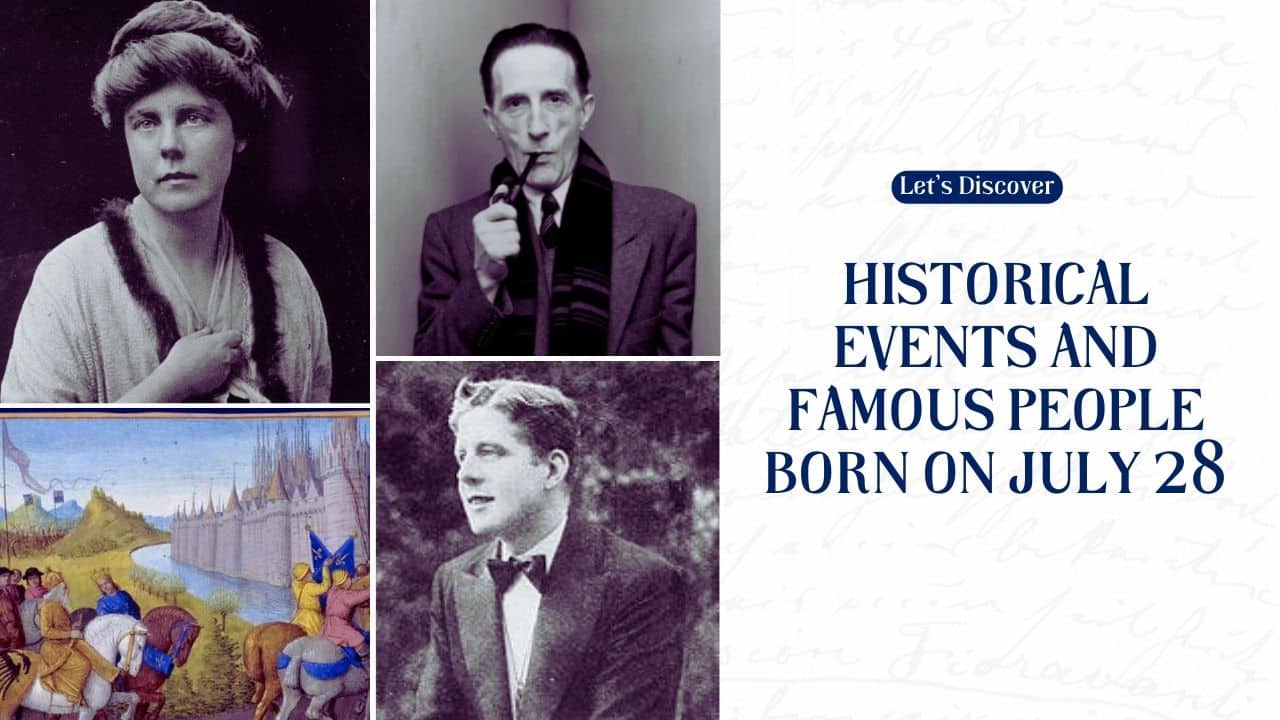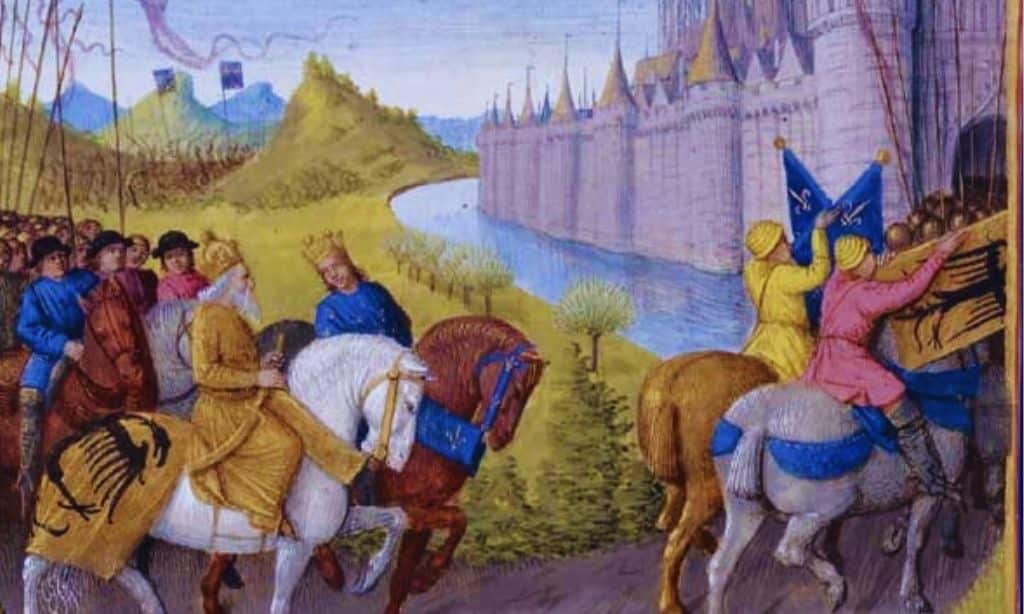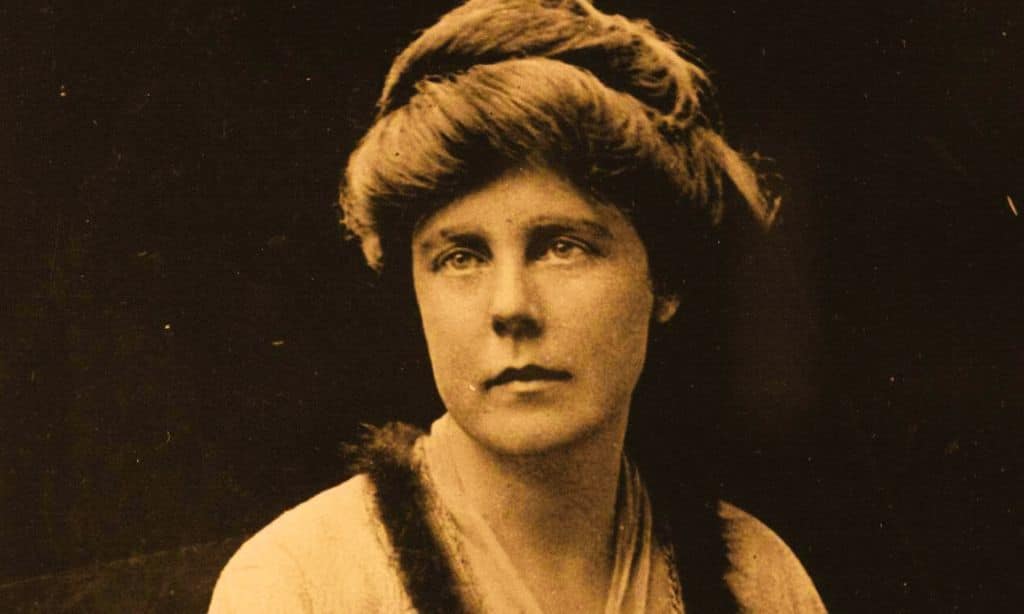Looking at history helps us understand our world better. July 28 is a day when many important things happened and when several famous people were born. In this article, we’ll learn about some big events that took place on July 28 in different years. We’ll also meet some interesting people who were born on this day. By the end, you’ll see why July 28 is a special day in history.
Historical Events of July 28th
1. Siege of Damascus Ends (1148)
In 1148, a big fight called the Siege of Damascus ended. This fight was part of the Second Crusade. The Crusades were wars fought between Christians and Muslims over holy lands.
The Second Crusade started because Muslims had taken a city called Edessa. The Christian leaders in Europe were worried, so they sent armies to fight back. They decided to attack Damascus, an important Muslim city.
The siege began on July 24, 1148. The Christian armies surrounded Damascus and tried to take it. But after only four days, they gave up. They left on July 28.
Why did they give up so fast? There were a few reasons:
- The Muslim defenders were very strong.
- The Christian leaders couldn’t agree on what to do.
- They were running out of food and water.
When the siege ended, it was a big loss for the Christians. It meant the Second Crusade had failed. This failure made the Muslim armies stronger and more confident. It also made the Christian kingdoms in the Holy Land weaker.
2. Treaty of Berlin (1742)
On July 28, 1742, two important rulers signed a peace agreement called the Treaty of Berlin. These rulers were Maria Theresa of Austria and Frederick the Great of Prussia.
This treaty was part of a bigger war called the War of Austrian Succession. This war started because some people didn’t want Maria Theresa to rule Austria. Frederick the Great had invaded part of Austria called Silesia.
The Treaty of Berlin did these things:
- It ended the fighting between Austria and Prussia.
- Prussia got to keep Silesia.
- Austria got Prussia to recognize Maria Theresa as the ruler of Austria.
This treaty was important because it helped Maria Theresa keep her throne. It also made Prussia stronger and more important in Europe.
3. Henry James Pye Becomes Poet Laureate (1790)
On July 28, 1790, King George III of England chose Henry James Pye to be the new Poet Laureate. A Poet Laureate is a special poet who writes poems for the king or queen and for big national events.
Pye was born in 1745 and came from a rich family. He wrote many poems and also worked in the government. When he became Poet Laureate, many people were surprised. They didn’t think he was a very good poet.
As Poet Laureate, Pye wrote poems about the king’s birthday and other royal events. But most people didn’t like his poems very much. Today, he’s remembered more for being a not-very-good Poet Laureate than for his actual poems.
4. Execution of Maximilien Robespierre (1794)
On July 28, 1794, a man named Maximilien Robespierre was executed in Paris, France. This was a very important event in the French Revolution.
Robespierre was one of the leaders of the French Revolution. He wanted to create a new government without a king. But he became known for using a lot of violence against people he thought were enemies.
The time when Robespierre had the most power is called the Reign of Terror. During this time, thousands of people were killed for being “enemies of the revolution.”
But eventually, other leaders thought Robespierre had gone too far. They arrested him on July 27. The next day, he was executed using the guillotine, a machine that cut off people’s heads.
When Robespierre died, the crowd cheered loudly. His death marked the end of the Reign of Terror and was a turning point in the French Revolution.
5. Release of Joséphine de Beauharnais (1794)
On the same day Robespierre was executed, a woman named Joséphine de Beauharnais was released from prison. This was also on July 28, 1794.
Joséphine had been put in prison during the Reign of Terror. Her first husband had been executed just five days earlier. But when Robespierre fell from power, many prisoners were set free, including Joséphine.
This event changed Joséphine’s life. Later, she met and married Napoleon Bonaparte, who became the leader of France. Joséphine became the Empress of France when Napoleon became Emperor.
Joséphine’s release from prison was the start of her journey to becoming one of the most important women in French history.
Famous Birthdays on July 28th
1. Beatrix Potter (1866-1943)
| Fact | Information |
|---|---|
| Full Name | Helen Beatrix Potter |
| Born | July 28, 1866 |
| Died | December 22, 1943 |
| Nationality | English |
| Occupation | Children’s Author and Illustrator |
| Famous Works | The Tale of Peter Rabbit, The Tale of Jemima Puddle-Duck |
| Other Interests | Natural Science, Conservation |
| Legacy | Created 23 children’s books, helped preserve the Lake District in England |
Beatrix Potter was born on July 28, 1866, in London, England. She loved animals and nature from a young age. She kept many pets and liked to draw them.
Potter is most famous for writing and drawing “The Tale of Peter Rabbit.” This book tells the story of a naughty rabbit who goes into a farmer’s garden. It was published in 1902 and became very popular.
After this, Potter wrote many more books about animals like ducks, cats, and mice. Her books are still loved by children today. They have simple stories and beautiful pictures.
Besides writing, Potter was interested in science and farming. She used the money from her books to buy farms in the Lake District of England. She wanted to protect the land and the traditional way of farming there.
Potter’s books have been translated into many languages. They have also been made into movies and TV shows. Her stories and drawings have made her one of the most famous children’s authors in history.
2. Lucy Burns (1879-1966)
| Fact | Information |
|---|---|
| Full Name | Lucy Burns |
| Born | July 28, 1879 |
| Died | December 22, 1966 |
| Nationality | American |
| Occupation | Suffragist, Women’s Rights Advocate |
| Known For | Co-founding the National Woman’s Party |
| Education | Vassar College, Yale University, University of Berlin |
| Notable Actions | Organized protests, went on hunger strikes, was arrested multiple times |
Lucy Burns was born on July 28, 1879, in Brooklyn, New York. She became one of the most important people in the fight for women’s right to vote in the United States.
Burns studied at several universities, including Yale and Oxford. While in England, she joined the women’s suffrage movement. This movement fought for women’s right to vote.
When she returned to America, Burns met Alice Paul. Together, they started the National Woman’s Party in 1916. This group used new ways to fight for voting rights. They organized protests and parades. They also stood outside the White House with signs asking for the right to vote.
Burns was arrested many times for her protests. She even went on hunger strikes in prison. This means she refused to eat as a form of protest.
The work of Burns and other suffragists led to the 19th Amendment to the U.S. Constitution in 1920. This amendment gave women the right to vote. Burns is remembered as a brave and determined fighter for women’s rights.
3. Marcel Duchamp (1887-1968)
| Fact | Information |
|---|---|
| Full Name | Henri-Robert-Marcel Duchamp |
| Born | July 28, 1887 |
| Died | October 2, 1968 |
| Nationality | French-American |
| Occupation | Artist, Chess Player |
| Famous Works | “Nude Descending a Staircase, No. 2”, “Fountain” |
| Art Movements | Cubism, Dada, Conceptual Art |
| Legacy | Challenged traditional ideas about art, influenced modern and contemporary art |
Marcel Duchamp was born on July 28, 1887, in France. He became one of the most important artists of the 20th century.
Duchamp started as a painter. His early work was influenced by a style called Cubism. His painting “Nude Descending a Staircase, No. 2” became very famous and caused a lot of discussion when it was shown in New York in 1913.
But Duchamp is most famous for inventing a new kind of art called “readymades.” These were everyday objects that he chose and presented as art. His most famous readymade was a urinal that he turned upside down and signed with a fake name. He called it “Fountain.”
Duchamp’s ideas changed how people think about art. He showed that art could be about ideas, not just about making beautiful things. His work influenced many later artists and art movements.
Besides making art, Duchamp was also a very good chess player. He even played for the French national team.
Today, Duchamp is seen as one of the most influential artists of his time. His ideas continue to inspire artists and challenge people’s ideas about what art can be.
4. Rudy Vallee (1901-1986)
| Fact | Information |
|---|---|
| Full Name | Hubert Prior Vallée |
| Born | July 28, 1901 |
| Died | July 3, 1986 |
| Nationality | American |
| Occupation | Singer, Actor, Bandleader, Radio Host |
| Famous Songs | “Deep Night”, “Stein Song”, “As Time Goes By” |
| Nickname | “The Vagabond Lover” |
| Legacy | One of the first modern pop stars, pioneered the use of the megaphone in singing |
Rudy Vallee was born on July 28, 1901, in Vermont, USA. He became one of the first big stars of American popular music.
Vallee started his career playing the saxophone in bands. But he became famous as a singer. He had a soft, gentle way of singing that was new at the time. People called this style of singing “crooning.”
In the late 1920s and 1930s, Vallee became very popular. He had his own radio show called “The Fleischmann’s Yeast Hour.” This show helped make many other performers famous too.
Vallee was known for singing through a megaphone. This became his trademark. He often sang romantic songs, which made him very popular with young women.
Some of Vallee’s most famous songs were “Deep Night” and “As Time Goes By.” He also appeared in many movies.
Vallee’s style of singing and performing influenced many later singers. He helped create the idea of the modern pop star. Even though his biggest fame was in the 1930s, Vallee continued to perform and act until near the end of his life.
5. Karl Popper (1902-1994)
| Fact | Information |
|---|---|
| Full Name | Sir Karl Raimund Popper |
| Born | July 28, 1902 |
| Died | September 17, 1994 |
| Nationality | Austrian-British |
| Occupation | Philosopher |
| Famous Works | The Logic of Scientific Discovery”, “The Open Society and Its Enemies |
| Main Ideas | Falsificationism, Critical Rationalism |
| Honors | Knighted by Queen Elizabeth II in 1965 |
Karl Popper was born on July 28, 1902, in Vienna, Austria. He became one of the most important philosophers of the 20th century.
Popper is best known for his ideas about science and knowledge. He said that for something to be scientific, it must be possible to prove it wrong. This idea is called “falsificationism.” It changed how people think about science.
Popper also wrote about politics and society. He believed in democracy and freedom of thought. He warned against what he called “closed societies,” where people aren’t free to question their leaders or traditions.
One of Popper’s most famous books is “The Open Society and Its Enemies.” In this book, he criticized some famous philosophers and defended democracy.
Popper’s ideas have been very influential in many fields, including science, politics, and economics. Many scientists and thinkers still use his ideas today.
In 1965, Popper was knighted by Queen Elizabeth II of England for his contributions to philosophy.
Thematic Connections and Historical Significance
Looking at these events and people, we can see some interesting patterns:
- Many of these events and people were part of big changes in society. The French Revolution, women’s rights movement, and new ideas in art and philosophy all challenged old ways of thinking.
- Several of these people, like Beatrix Potter and Marcel Duchamp, changed how we think about art and culture.
- The events on July 28 often marked the end of one era and the beginning of another. The end of the Siege of Damascus was a turning point in the Crusades. The execution of Robespierre ended the Reign of Terror in France.
- Many of these people and events still affect us today. We still read Potter’s books, think about Duchamp’s art, and use Popper’s ideas about science.
These connections show us how events and people from different times and places can all be part of bigger historical changes.
Takeaways
July 28 is a day full of important historical events and birthdays. From the end of a medieval siege to the birth of modern philosophers, this day has seen many significant moments.
Learning about these events and people helps us understand how our world has changed over time. It also shows us how people in the past have shaped the world we live in today.
By looking closely at one day in history, we can see how complex and interconnected historical events are. This can encourage us to keep learning about history and to think about how we might be part of making history ourselves.
References:
- Runciman, S. (1952). A History of the Crusades: Volume II. Cambridge University Press.
- Ingrao, C. (2000). The Habsburg Monarchy, 1618–1815. Cambridge University Press.
- Lane, M. (1946). The Tale of Beatrix Potter. Frederick Warne & Co.
- Lunardini, C. (1986). From Equal Suffrage to Equal Rights: Alice Paul and the National Woman’s Party, 1910-1928. New York University Press.
- Tomkins, C. (1996). Duchamp: A Biography. Henry Holt and Company.
- Erenberg, L. (2004). Swingin’ the Dream: Big Band Jazz and the Rebirth of American Culture. University of Chicago Press.
- Hacohen, M. (2000). Karl Popper – The Formative Years, 1902-1945: Politics and Philosophy in Interwar Vienna. Cambridge University Press.






































